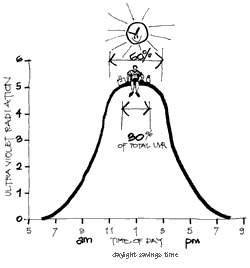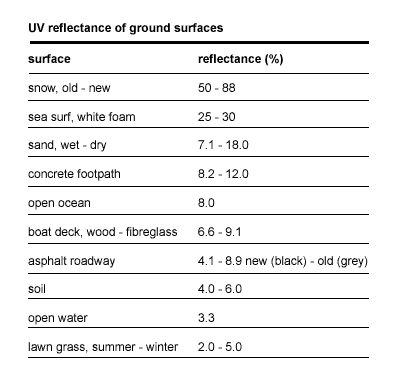 |
 |
||||||
| Shade Facts | Shade Design |
Shade Modeller |
Shade Audit |
|
Factors affecting UV radiation
levels
| ||
|
Sun Risks Truths and myths About skin cancer UV radiation & the sun Ultraviolet (UV) radiation Direct & indirect UV radiation Factors affecting UV levels The UV index UV radiation and vitamin D Plotting Shade The sun's daily + annual path Finding North Protecting against UVR Shade - the best protection Controlling direct UV radiation Controlling indirect UV radiation Links to related sites |
1
Season and time of day The single most important factor is the height of the sun in the sky – the higher the sun, the higher the levels of UV radiation. The height of the sun varies with season and time of day.
 2 Geographic location Your latitude also contributes to UV radiation levels. The closer you are to the equator the higher the UV radiation levels. This is why UV radiation levels in Australia and New Zealand are higher than those in Europe and most of North America. Within Australia and New Zealand, UV radiation levels are consistently high in summer regardless of latitude, but in winter they vary greatly. Altitude also affects UV radiation levels. UV radiation levels increase by around 4% with every 300 metres of altitude. 3 Surrounding environment Different surfaces reflect UV radiation to greater or lesser degree, and so environments which contain highly reflective surfaces have high indirect UV radiation levels. See the table below for the reflectivity of different surfaces:  4 Other factors Heavy cloud can reduce UV radiation levels to less than 5% of that under clear skies. Scattered cloud has a variable effect - levels rise and fall as clouds pass in front of the sun. Decreases in stratospheric ozone (the “ozone layer”) increase UV radiation levels, and a sustained decline has the potential to significantly increase skin cancer rates in the long term. Air pollutants and other particles in the atmosphere, such as dust, can reduce UV radiation levels. | |